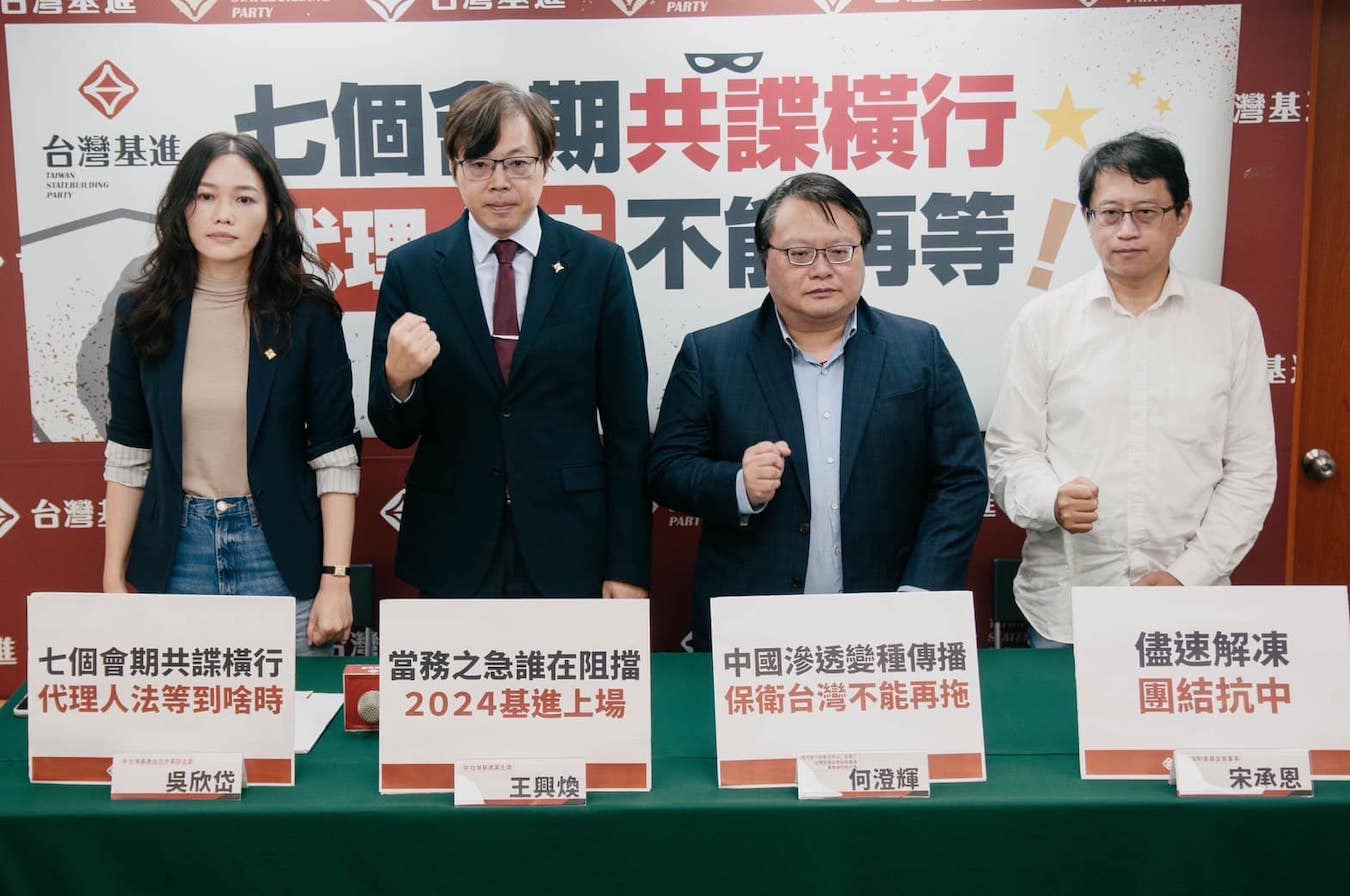by Brian Hioe
語言:
English
Photo Credit: Taiwan Statebuilding Party/Facebook
REPRESENTATIVES OF THE Taiwan Statebuilding Party (TSP), Kuma Academy, and international law expert John Sung Cheng-en held a press conference earlier this month to call for strengthening measures to combat Chinese influence. The TSP was represented by Taipei chapter head Wu Hsin-tai and party chair Wu Hsing-huan, while the Kuma Academy was represented by CEO Ho Cheng-hui.
In particular, the issue is expected to come up before the 2024 presidential elections. The last time an Anti-Infiltration Bill to combat Chinese political influence seriously came up in Taiwanese politics was before the 2020 elections.
It is generally expected that China will seek to influence the 2024 presidential elections in some form. This could involve the use of social media-based misinformation and disinformation, military exercises aimed at intimidating Taiwan, as well as other means. For example, the detention of Taiwan-based publisher Fucha, who was a Chinese national in the process of naturalizing to Taiwanese citizenship, suggests that China could carry out kidnappings aimed at intimidating Taiwan.
Nevertheless, the press conference focused on the issue of regulating Chinese influence in Taiwan. The press conference sought to draw attention to the lack of measures for regulating Chinese funding in Taiwan, seeing as influence operations will require funding.
 Photo credit: Taiwan Statebuilding Party/Facebook
Photo credit: Taiwan Statebuilding Party/Facebook
Concerns raised were that China could potentially “buy up” influence in Taiwan, such as by purchasing or funding media organizations. This has been a concern raised in Taiwan for over a decade, going back to the 2011 and 2012 Anti-Media Monopoly Movement, which was in reaction to the purchase of China Television Systems and the China Times by pro-China business magnate Tsai Eng-meng. In the years since, it has been reported by the Financial Times and other outlets that Tsai-owned media outlets directly take orders from China’s Taiwan Affairs Office and accept funding from China.
However, despite the Tsai administration making efforts to regulate Chinese over-the-top providers, its lawsuit over Tsai-owned CtiTV’s frequent violations of broadcast laws is still fighting it out in the courts. The Tsai administration appointed a number of media experts active in the Anti-Media Monopoly Movement to the National Communications Commission but has still faced challenges with efforts to regulate Chinese influence in the media.
To this extent, the press conference cited foreign agent registration in other countries, such as the US, UK, and Australia, as offering potential precedents for Taiwan to follow. Taiwan currently lacks this system and it is often unclear as to what counts as a foreign agent because of the ROC framework. This has caused complications with regards to immigration, asylum law, COVID-19 regulations, accident compensation, and other issues in the past, although the Executive Yuan recently mandated that Chinese should no longer be treated as ROC nationals. But, the aim would be to call for greater transparency about news outlets or organizations that may be acting on behalf of foreign institutions.
Likewise, that Chinese spying sees light penalties in Taiwan was raised during the press conference. This includes jail sentences that are an average of only eighteen months–cannabis convictions in Taiwan are sometimes longer than spy convictions.
It is to be seen whether the issue will come up in any genuine way. During the last election cycle, for example, one notes that Tsai Ing-wen introduced the issue into the political discourse immediately before elections, calling for passage of a law shortly before the vote, and the DPP quickly passed an Anti-Infiltration Law in the legislature.
Yet this was mostly a political move aimed at quickly hitting back at the KMT rather than substantive legislation aimed at curbing what is a long-term problem. Tsai saw some criticism for this. But the DPP may not view the issue as particularly significant if it is still able to win elections in spite of Chinese interference. To this extent, the press conference suggested that while pan-Blue parties may not wish to pass such laws because it could affect their campaigning, the DPP is reluctant to offend Taiwanese businessmen in China that it depends on for funding, or who may have a significant influence on industry in Taiwan. It is to be seen, then, if there will be any push for genuinely passing any Anti-Infiltration Law with substantive force.

